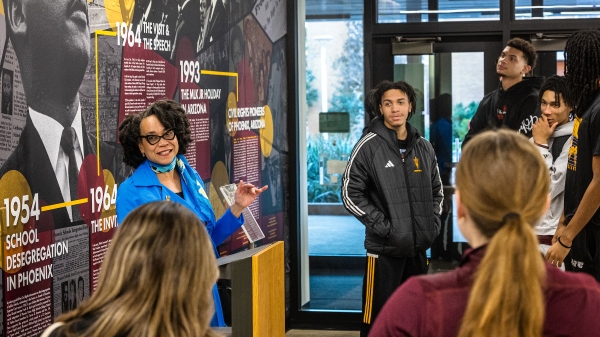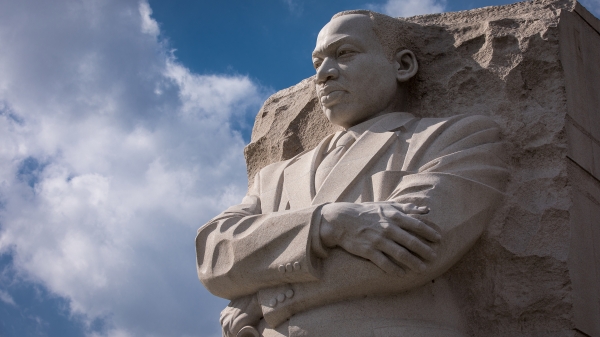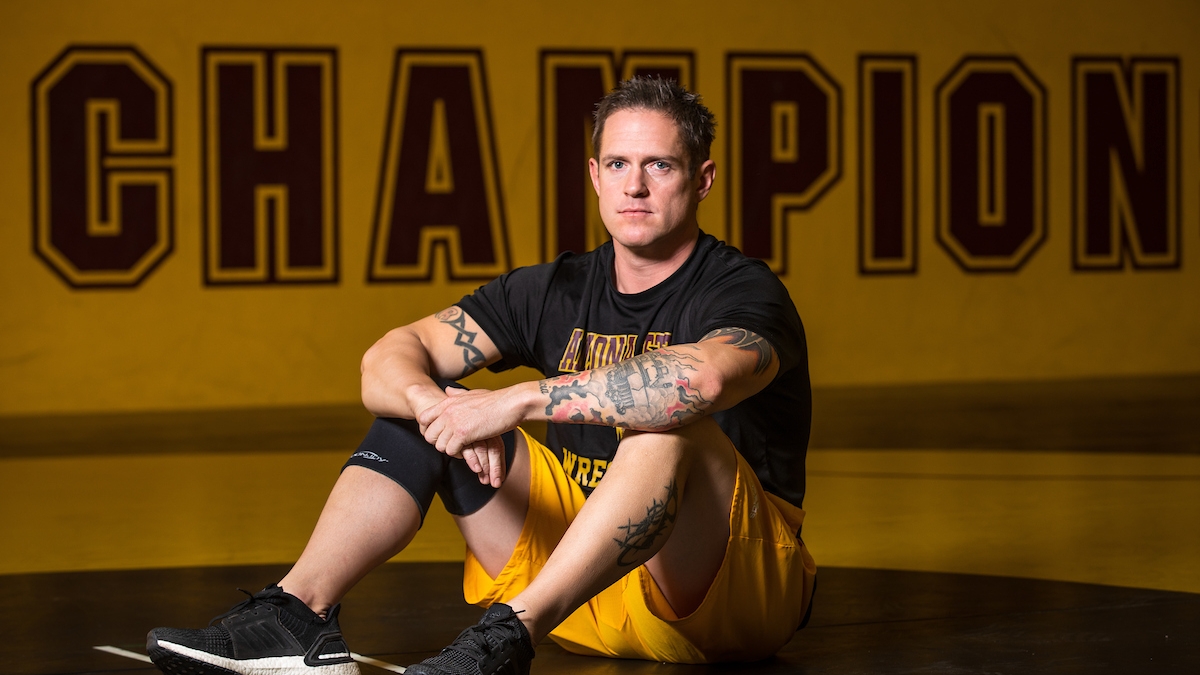Editor's note: This story is being highlighted in ASU Now's year in review. Read more top stories from 2019.
In his 34 years, Arizona State University student veteran Roman Rozell has survived his parents' divorce, addiction, six combat concussions and being struck by lightning.
Amidst these slings and arrows, Rozell has managed to write a book, obtain an associate degree (he’s working on his undergraduate) and kickstart a motivational speaking career all while getting married and fathering six children. Oh, and he also finds time in his busy schedule to wrestle for the university — as the oldest walk-on in school history.
“I’m actually pretty good today,” Rozell said — somewhat in amazement — of his life, which includes graduating this May with a degree in sociology. “I’m breathing. I don’t have any illnesses. I have a stable family life and all of these things have shaped me, I guess, into a better version of myself.”
There was a time though, when things could have easily gone the other way.
Rozell was born in Mesa in 1984. His parents divorced when he was 6, and he and his younger sister were raised by his mother, who Rozell said got into toxic relationships and drugs, leading to hardships including homelessness, hunger and abject poverty.
Growing up, Rozell said he averaged three to four schools a year and often ended up squatting in vacant homes and trailers when the rent was due.
Sometimes his family ended up in remote places such as Snowflake, Arizona, and they once lived next to an Indian reservation, where the nearest neighbors were miles away.
Contact with the outside world was minimal at times. Every day was a struggle for survival.
“For sure, Roman had a rough beginning as a kid,” said Rozell’s mother, Nancy Donley, who entered a recovery program in 2003 and has been sober ever since. “There were a lot of scary things he had to deal with and he never gave up.”
Scary took on many forms. Electricity, running water and flushing toilets were considered luxuries. Daily meals were never guaranteed.
“Sometimes we’d have a cake pan of chili in the refrigerator and that had to last a couple of days," he said. "Other times, we’d take sprinkled cheese and sauce packets from Taco Bell just to have some type of food.”
At 13, Rozell’s father got custody of him and his sister and introduced them to a more stable home life. Rozell also got into wrestling around the same time. The sport provided him a sorely needed outlet and, for the first time, positive attention.
Rozell became a standout athlete at Apache Junction High School and was the first male in his family to graduate. He also received plenty of scholarship offers to wrestle, including from Boise State, William Penn and Dakota Wesleyan. However, addiction began to take hold in his own life. At 18, Rozell was involved in drug use and was expecting a child with his teenage girlfriend. He also suffered a severe shoulder injury. It was a low point.
Things began looking up when he received a phone call from Paul Bartlett, the wrestling coach at Northwestern College in Orange City, Iowa, offering him a scholarship. Initially Rozell turned it down, telling Bartlett he was “damaged goods."
“You don’t want me around,” Rozell told him.
But Bartlett was unrelenting. He told Rozell that he needed to graduate and make something of himself for his new family.
“I told him that I too had made bad choices and was damaged goods in a way, but had some folks who believed in me,” said Bartlett, now a kinesiology professor at Northwestern. “I viewed coaching as ministry and so my philosophy was that anyone who God dropped in my lap was someone I needed to invest in.”
Rozell bit and in the summer of 2003, he moved to Iowa and enrolled in school. Shortly after the season started, he injured his shoulder again. Rozell wondered how he’d take care of his growing family. And was it fair to his girlfriend (now wife) Alicia that he was off wrestling in another state while she was home alone and paying all the bills? After spending three semesters at Northwestern, Rozell enlisted in the Army.
Joining the ranks
The military appeared to have no downside, Rozell said. It offered him financial stability, health benefits for him and his family and college tuition when he got out of the service.
It turned out to be a good fit. Rozell took to the Army’s regimented lifestyle and was swiftly promoted. In 2006, he was deployed to Iraq for the first time as a tanker with the 1st Calvary Division. After 15 months there and a brief visit in the U.S., he deployed again in 2008.
He did not emerge unscathed.
Rozell suffered six concussions from several explosions, resulting in traumatic brain injury. One of those explosions was a suicide bombing; a fellow soldier lost a leg and his lieutenant was killed. Surprisingly, these incidents only emboldened Rozell, who shortly thereafter qualified for the U.S. Army Special Forces.
But it seemed every time Rozell received good news, it was tempered with bad. While in the Special Forces, his wife suffered a miscarriage and developed thyroid cancer. He was also struck by lightning while out on field maneuvers. He was taken to a hospital and recovered quickly. He was out in the field the next day.
His wife also made strides in her cancer recovery and eventually had twins. Rozell also attained his Green Beret and was assigned to the 7th Special Forces in Fort Walton Beach, Florida. But while there, he began suffering panic attacks and nightmares as a result of post-traumatic stress disorder.
“The brain is pretty unique because it knows how to compartmentalize things,” Rozell said. “But trauma is trauma. I’d discovered you have to have a wellness plan in place because there’s no happy pill for this condition.”
The road to ASU
Between his panic attacks, the demands of his job duties and his ever growing family, Rozell decided that after 14 years in the Army, it was time to do something else. That road led him back to ASU in 2018, where he put his GI Bill to use and initially pursued a teaching degree, but switched to sociology and hopes one day to become a mental health counselor.
Before he finished his active duty, Rozell started coaching high school wrestling and his passion for the sport was ignited again. He also began training and getting into shape. At 33, he rekindled his dream of wrestling on the collegiate level.
But that was easier said than done. He had to wait about four months to discover if he still had any eligibility left. Usually 25 is the maximum age to compete in the National Collegiate Athletic Association. However, exceptions are made for members of the military and Latter-day Saints.
Because Rozell was in the military for 14 years, he is considered a sophomore in terms of eligibility.
“I eventually discovered I’m the oldest Division 1 wrestler in the country, but I’m 19 on paper,” Rozell said. “Wow!”
Once that was settled, Rozell met with Don Bocci, ASU’s senior associate athletic director, who in turn met with head wrestling coach Zeke Jones. They were split on the idea.
“My first inclination was not to add him to the roster because this sport is not recreational. It’s not a pickup sport. The demands on the body are so great,” Jones said. “The lifespan of a wrestler is about the lifespan of a fly. The average age of an Olympic wrestler is 23. To see somebody wrestle over the age of 30 is very unusual.”
Bocci suggested Jones have a second meeting with Rozell, hoping the coach might think beyond the win/loss column. Jones said after he heard Rozell’s personal story, his stint in the military, and the sacrifices he made for this country, he changed his mind.
“Someone who is willing to risk his life understands sacrifice,” Jones said. “If he could teach our team what it’s really like to sacrifice everything for something you believed in, certainly that could rub off on our team — and has.”
Rozell demonstrated his commitment to sacrifice immediately. He spent six months training before he stepped on the mat and sparred with other wrestlers. His appearance on the team roster took many by surprise but he eventually found his niche on the team — as a mentor to his younger teammates.
“When I first saw Roman, I wasn’t really sure who he was. I thought maybe he was a new coach. Then he told me, ‘Yeah, I’m trying to walk on,’” said Alex Torres, a 19-year-old sophomore who graduated from Tempe’s Marcos DeNiza in 2018.
Torres and Rozell struck up a friendship, which soon turned into a mentorship.
“We’ve talked about faith, finances, family, politics and how he’s a father and married,” Torres said. “For me, it was basically questions about life and how to navigate through it. He’s just a good person. He wants to help everyone.”
Austin Housegood, 20, recently left the wrestling team to focus on his studies. He’s also interested in a military career and is leaning heavily on Rozell for advice in that area.
“My goal is to become a Green Beret like he was, and I want to get some idea of what they’re looking for and what that lifestyle looks like,” said Housegood, who is a construction manager major in the Ira A. Fulton Schools of Engineering. “I’ve learned a lot from Roman simply by observing him, how he carries himself and how hard he works. There’s where I have that respect.”
R-E-S-P-E-C-T
Rozell has also earned respect off the mat. He does public speaking, training sessions, seminars and webcasts to help individuals make the postmilitary or athletic career transition.
And somehow he found time to write a book: "A Dose of Inspiration: The Warrior Lifestyle Journal" was published in June.
His mother is not surprised by her son’s tenacity.
“There’s no stopping him, and he’s always been that way,” Donley said. “He never ceases to amaze me.”
Alicia Rozell, his wife of 15 years, said the secret to her husband’s success is the backing of his family.
“Between the military teaching him time management and having good family support, he’s able to pull this off,” she said. “I’m happy that he’s doing things that make him happy but that he doesn’t just make goals but does everything he can to achieve those goals. And that sets a great example for our kids, other students and other soldiers.”
His next big battle is on the mat when the No. 5 Sun Devils take on Augustana College out of South Dakota in a dual meet on Nov. 15 at the Desert Financial Arena (formerly the Wells Fargo Arena) in Tempe. Rozell was recently given a big confidence booster by Jones, who named him as a starter in the 197-pound division. He'll also be there cheering his teammates on, ready to help them take the fight to their opponent.
“As a team we eat, train and bleed together, and repeat it day in and day out. We are all one team and we fight as one,” Rozell said. “I will always be prepared for the opportunity rather than have an opportunity and not be prepared, but I don’t have to be a starter to serve a purpose on this team.”
Top photo: Sociology senior and retired Green Beret Roman Rozell finds time among his academic work, family life with five children and motivational speaking engagements to wrestle for the university as the team’s oldest walk-on. After serving in the Army for 14 years, he plans to pursue a career in mental health counseling. Photo by Charlie Leight/ASU Now
More Sun Devil community

ASU connects younger, older generations to ease loneliness
When Pencie Culiver sits down on a bench every Tuesday outside Coor Hall, the students are drawn to her and her big sign that says, “I’m All Ears.”She soothes their sorrows, delights in their joys…

Local athletes get crash course on Black history in Arizona
Basketball players from Arizona State University and the Valley Suns gathered on Jan. 6 to learn about Black history in Arizona and Martin Luther King Jr.’s visit to ASU's Tempe campus in 1964.The…

ASU names 2025 MLK Servant-Leadership Award recipients
The 2025 honorees have been named for Arizona State University's annual MLK celebration awards.The four awards — community, faculty, staff and student — recognize leaders who dedicate themselves to…
